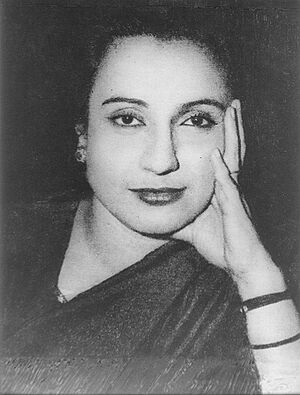Shaista Suhrawardy Ikramullah facts for kids
Quick facts for kids
NI
Shaista Ikramullah
শায়েস্তা ইকরামউল্লাহ شائستہ اکرام الله |
|
|---|---|

Begum Shaista Ikramullah
|
|
| Member of the Constituent Assembly of Pakistan | |
| In office 10 August 1947 – 24 October 1954 |
|
| Constituency | East Bengal |
| Personal details | |
| Born | 22 July 1915 Calcutta, Bengal, British India |
| Died | 11 December 2000 (aged 85) Karachi, Sindh, Pakistan |
| Nationality | Pakistani |
| Spouse |
Mohammed Ikramullah
(m. 1933; died 1963) |
| Children | Inam Ikramullah Naz Ikramullah Salma Ikramullah Sarvath Ikramullah |
| Parent |
|
| Alma mater | University of Calcutta (B.A) SOAS, University of London (Ph.D) |
| Occupation | Politician, diplomat, writer |
Shaista Suhrawardy Ikramullah was a very important woman from Pakistan. She was born on July 22, 1915, and passed away on December 11, 2000. Shaista was a talented politician, a skilled diplomat, and a wonderful author.
She made history as the first Muslim woman to earn a PhD from the University of London. Later, she served her country as Pakistan's ambassador to Morocco. This was from 1964 to 1967. She also worked with the United Nations. There, she helped make sure that the Universal Declaration of Human Rights used language that included everyone, no matter their gender.
Contents
Early Life and Learning
Shaista Ikramullah was born in Calcutta, which was part of British India at the time. Her full birth name was Shaista Akhtar Banu Suhrawardy. She came from the well-known Suhrawardy family. Her father was Hassan Suhrawardy. Her mother was Sahibzadi Shah Banu Begum.
Shaista went to school at Loreto College, Kolkata. She was a very dedicated student. She later became the first Muslim woman to get a PhD from the University of London. Her special research was about how Urdu novels and short stories grew over time.
Family Life
In 1933, Shaista married Mohammed Ikramullah. They had four children together. Their children were:
- Inam Ikramullah
- Naz Ashraf
- Salma Sobhan
- Princess Sarvath of Jordan
Becoming a Leader
After she got married, Shaista made a big change. She was one of the first Indian Muslim women of her time to stop practicing purdah. This meant she no longer stayed hidden from public view.
A famous leader named Muhammad Ali Jinnah encouraged her to get involved in politics. Shaista became a leader in two important groups. She led the Muslim Women Student's Federation. She also worked with the Women's Sub-Committee of the All-India Muslim League.
In 1945, the Government of India asked her to attend a big meeting. It was called the Pacific Relations Conference. But Jinnah wanted her to represent the Muslim League instead. He wanted her to speak for their cause. So, she did not accept the government's offer.
Political Achievements
Shaista was chosen to be part of the Constituent Assembly of India in 1946. However, she did not take her seat. This was because other politicians from the Muslim League also did not join.
When Pakistan became an independent country in 1947, she was there. She was one of only two women chosen for the first Constituent Assembly of Pakistan. This group helped create the new country's laws.
She also worked as a delegate for the United Nations. She helped create two very important documents. One was the Universal Declaration of Human Rights in 1948. The other was the Convention Against Genocide in 1951. These documents are still important today.
From 1964 to 1967, Shaista was Pakistan's ambassador to Morocco. This meant she represented Pakistan in that country.
Later Years and Legacy
Shaista Ikramullah passed away on December 11, 2000. She was 85 years old. She died in Karachi, Pakistan.
In 2002, the President of Pakistan honored her. She was given the highest civilian award in Pakistan. It is called the Nishan-i-Imtiaz, or "Order of Excellence." This award was given to her after her death to recognize her great contributions.
See also
 In Spanish: Shaista Ikramullah para niños
In Spanish: Shaista Ikramullah para niños
 | Charles R. Drew |
 | Benjamin Banneker |
 | Jane C. Wright |
 | Roger Arliner Young |

